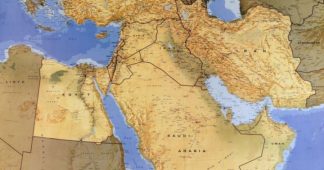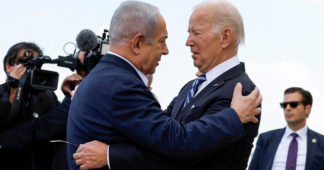By Marwan Emil Toubasi
Sullivan’s visit to the region aimed to direct and correct relations between the United States and Israel essentially, and to reach agreements and understandings related to security and politics in the region in accordance with the foundations of the strategic relationship between the two parties and to advance it in a way that represents the desire of the United States to implement its vision about the New Middle East and its need for a role as Israeli is an assistant and partner in this.
It also affirms the United States’ support for Israel’s efforts to continue its war plans of extermination and displacement against our people under the justification of “fighting Hamas.”
There is clear tension between Netanyahu and the US administration, as the Biden administration expressed its concern about Netanyahu’s policies, which it considers unstable and may further complicate the situation in the region and do not serve the essence of the strategic relations between them. The United States is focusing on enhancing what it calls “regional stability” and confronting Iranian influence through implementing their project called the “New Middle East,” which carries confused, incomplete, and unclear concepts about the Palestinian state that they talk about according to their standards and want to market it without implementing the rights of our people, first and foremost the right to self-determination. It may be a “state” according to Trump’s previous vision. So the US sees some of Netanyahu’s policies as an obstacle to these goals, which do not even require ending the occupation.
There is a connection between these tensions and the relationship, which does not actually affect Israel’s status and importance to the United States, with broader American projects in the Middle East that the United States is pursuing in the face of growing Chinese and Russian influence, such as the Middle East Economic Corridor initiative in the face of the Belt and Road project, which aims to Strengthening economic and logistical cooperation to serve the interests of American hegemony in the region, as well as controlling the gas basins in the eastern Mediterranean and strengthening its military presence through the deployed bases in addition to the new base in the Negev Desert and the so-called floating port on the shores of Gaza and the Ben Gurion Canal, the implementation of which requires the territory of the Gaza Strip.
However, assuming that the United States does not seek to change the Israeli government directly, it is focusing on diplomatic and military pressure to ensure that Israeli policies are consistent with its regional interests.
The United States realizes that the dispute between Gantz and Netanyahu could affect the dynamics of the war in Gaza, especially with regard to managing the crisis and achieving results. The White House prefers to deal with Gantz to facilitate the implementation of these goals in Gaza and the type of major military operations, such as the plan to strike the ideology and culture of resistance in the region, as well as the tendencies of the Palestine Liberation Organization, and the completion of the “humanitarian” aggression plans in Rafah and the rest of the Gaza regions after the escalation of guerrilla warfare actions that kill numbers of israeli solediers daily and raises its costs on the ground and at the level of economic impact as well. Also, implementing the American vision in our region regarding “voluntary” displacement, weakening the role of the Palestinian national authority, besieging it, and monitoring or participating in the complete destruction of Gaza and making it an uninhabitable place on the other hand.
In this regard, there are opinions indicating that the Biden administration is seeking to strengthen the role of Gantz, who rejects the idea of the presence of “Hamas or Abbas” in Gaza, as he said, which is actually consistent with the American view of their name “The Day After,” as a potential alternative to Netanyahu, which reflects its dissatisfaction with Netanyahu’s policies. Hard-line and indicates its desire to see changes in leadershipIsrael may help achieve progress towards its concept of the mirage of a two-state solution.
Accordingly, it seems that the United States is using internal disputes in Israel as a means to put pressure on Netanyahu, and to direct Israeli policies towards goals that are more compatible with the American vision, especially with regard to managing the conflict in Gaza in order to implement the “the next day” statement that i mentioned about.
Benny Gantz’s recent speech, in which he issued an ultimatum to Benjamin Netanyahu to present a post-war plan for Gaza by June 8, carries major repercussions for the stability of the current Israeli government. Gantz has threatened to leave the ruling coalition if his demands are not met, which increases the pressure on Netanyahu. He is seeking to strengthen his political position by demanding a clear plan to end the conflict without ending the occupation (like someone who wants to eat the cake and keep it) and achieving specific goals that include alternatives to Hamas rule in Gaza and return the Israeli prisoners that agree with the American vision of the next day, as I mentioned.
These developments place the occupation government in a critical position, as Gantz’s resignation or departure from the coalition may lead to destabilization of the current israeli government. On the other hand, there is tension within the government between Netanyahu and other members, such as Defense Minister Gallant, and outside of it, Lapid’s positions that he spoke about yesterday in his speech to the demonstrators, all of which contributes to the complexity of the political situation.
In short, Gantz’s speech reflects the tensions and exacerbation of the large internal structural crisis in Israel that has deepened at all levels for a year and a half, and more specifically after October 7, and could lead to important political changes that the United States may desire and also desire to see “renewed Palestinian national authority.” Which Sullivan talks about includingIt is consistent with the American vision and works under its guidance, to be a participating part with a renewed Israeli government in implementing their ametican integrated vision as they desire.
While the United States seeks to strengthen its influence in the region through so-called economic cooperation and confronting security challenges, pressure on the Netanyahu government as a result of these internal and external tensions remains necessary for it to pass its projects without objection or obstruction.
It remains for us, the victims of the history of colonialism, to insist that the next day represent our vision based on the unity of the people and the land and our national cause, which must be embodied through the right to self-determination and the establishment of our sovereign and democratic state over all the territories occupied in 1967, with Jerusalem its capital, and resolving the refugee issue in accordance with Resolution 194 . For our project National liberation, which also aims to end Zionist thought, the justification for the existence of the settler colonialism and apartheid system, with a joint Palestinian and prograssive Jewish responsibility to support the forces of freedom and justice in this world wherever they are.
We remind our readers that publication of articles on our site does not mean that we agree with what is written. Our policy is to publish anything which we consider of interest, so as to assist our readers in forming their opinions. Sometimes we even publish articles with which we totally disagree, since we believe it is important for our readers to be informed on as wide a spectrum of views as possible.











